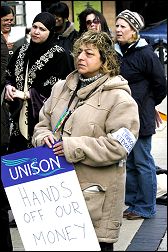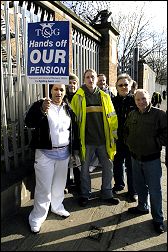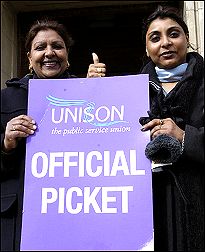28 March national pensions strike
Pensions’ strikers say…
‘Time for a new working-class party’
 HUNDREDS
HUNDREDS
OF striking local government workers signed
the declaration for a new workers’ party on the picket lines on 28
March. They were outraged that their union leaders have been donating
millions of pounds to a Labour Party that then turns round and attacks
their pensions.
“THERE WERE about 300 striking workers at the rally in
Southampton,” reported Nick Chaffey:“Socialist Party members went round with the Campaign for a
New Workers’ Party (CNWP) declaration and got a great response. We had
to have a lengthy conversation with everyone who signed, they were so
enthusiastic about the campaign.“After the rally we held a Socialist Party/CNWP meeting. 16
people came – mostly striking UNISON and TGWU members and some PCS
activists. We had a good discussion about the cuts being imposed on
everyone’s workplace, pay and conditions and the need for the trade
unions to organise effective opposition.“The strikers felt the next pensions strikes should be two or
three days long and raised some questions about the wisdom of
selective action.“We’ve been raising the question of building a new workers’
party in our UNISON branch for a while. And today’s meeting meant we
were able to establish it more firmly amongst Southampton council
workers.“Earlier when I visited the picket line at a council depot,
the TGWU steward told me he was particularly worried about all the
attacks on young people at the moment – the attack on pensions is just
part of the story. But he’d done something about it, got young workers
into the union and there were several young TGWU members with him on
the picket line.”
GLENN KELLY is a local government representative on the national
executive council of UNISON. He was elected trade union liaison officer
at the Campaign for a New Workers’ Party (CNWP) conference on 19 March
and spoke to the socialist in that capacity.
He said:
“I can understand why millionaires give money to the Labour
Party – but not union leaders. Millionaires get something in return
and it’s not just peerages. They get to dictate education policy and
win juicy NHS contracts.“But what have UNISON members got from the millions of pounds
that our union leaders have handed over to Labour? Cuts, privatisation
and vicious attacks on wages, conditions and services.“The pensions strike shows that the time has come to stop
funding the party that’s kicking us in the teeth. It’s time for a new
working-class party. We aim to have at least 5,000 signatures by the
end of the year on our declaration for a new workers’ party.“Help us build a campaign for a party that will defend our
pensions and stand up for our rights in the same way that New Labour
stands up for the bosses and the millionaires.”
UNISON shamed into freezing support for Labour
 ON
ON
THE local government pension picket lines, many signed the declaration
in support of the Campaign for a New Workers’ Party. New Labour’s attack
on pensions has made many UNISON members angrily question why their
union funds are still going to Labour Party. This anger has now
percolated to the union’s leaders.
At the last meeting of UNISON’s ruling National Executive Council
(NEC), North West NEC member Roger Bannister asked if there was any
truth in the rumour that the union’s Labour Link organisation had taken
a decision not to recommend support for New Labour in the municipal
elections in May.
The question was greeted with a derisive snort from the chairperson
of the Labour Link, who strongly denied any truth in this rumour.
Since then however it seems that harsh reality has struck home even
within the barricaded confines of the Labour Link, which carried the
following resolution at its last meeting:
“In the circumstances of the union taking national industrial
action against the Deputy Prime Minister, John Prescott, named as
Regulator and decision maker regarding the Local Government Pension
Scheme (LGPS), it is felt that it is not appropriate or politically
sensible to be organising, on one hand, for industrial action by the
union while sending out letters and leaflets to many of the same
members asking them to vote Labour.“The decision has been taken to suspend our election
campaigning work for Labour in the May elections while the industrial
action is going on.“Labour Link will not be giving any further donations or
support to the campaign until we reach a solution to the present LGPS
issue.“This is a decision that affects our work for Labour’s
election campaign in May nationally and locally.”
This unprecedented step is clearly welcome and well in line with the
actual views of the members whose pensions are being attacked by the New
Labour government. But why stop with the pensions dispute? New Labour
has privatised schools, housing and vast tracts of the National Health
Service. It is time that we used the political fund to support
politicians that supported us, and not vice versa!
Escalate the strike action
 OVER
OVER
ONE million local government workers joined the one-day strike on 28
March to defend their current pension entitlements. They showed the
volcanic anger amongst working-class people against Blair and the Labour
government.
Council workers are rightly furious about attempts to strip their
relatively meagre pension entitlement when government ministers, MPs and
fat cats have protected their sumptuous pensions. Female local
government workers get on average £31 a week in their pension packet
compared to the £700-plus a week that MPs can get.
This was the biggest co-ordinated strike action for over two decades
and a strike that government and union leaders had wanted to avoid.
In March and October 2005 the government, realising the balance of
forces weighed against it when two previous pensions’ strikes were
looming, retreated and ring-fenced existing workers’ conditions in the
health sector, education and the civil service. Since then it retreated
further over firefighters’ pensions and gave protection to existing
firefighters’ pension schemes.
Local government union leaders had assumed, wrongly, that the
government would automatically give the same protection to existing
local government workers. But, the government was caught in a bind
between the intransigence of the Tory-controlled local government
employers’ association and the government’s own inability to find enough
‘wriggle room’ to allow union leaders to call off threatened action.
The government had thought it could offer an inferior deal to local
government workers than to other public-sector workers and get away with
it. However, such is the mood amongst local government workers that
their union leaders know they could accept nothing less than what was
previously offered to other public-sector workers.
Pay limits threat
ADDING FUEL to the flames the Blair/Brown government ann-ounced in
last week’s budget that it was imposing a public-sector pay limit of
2.2% (except for nurses) and carrying out further massive job cuts in
the public sector – especially in the Department for Work and Pensions (DWP).
Little wonder then that even the UNISON Affiliated Political Fund (Labour
Link) was obliged last week to suspend support for New Labour in the May
elections while industrial action continues.
Local government workers need to put pressure on their union leaders
to develop a coherent strategy for winning their pensions dispute. At
present, the leaders are sending out mixed messages on how the struggle
is to be developed if the government doesn’t back down after the recent
action.
 At
At
local level, union activists organised effectively for the strike day to
ensure the strike action would bite. At national and regional level,
however, union leaders kept inter-union co-operation to a minimum, tried
to play the strike down and organised low-key rallies rather than
marches to bring striking members of all unions together.
The bigger unions, like UNISON, tried to give the appearance of
having a strategy to take the strike forward – including selective
action, regional action in April and a further two days of strike action
on 4 and 5 May.
The socialist has pointed out before that selective action should
only be an auxiliary to more generalised action involving all the
workers. In itself, selective action cannot be the way forward for this
strike. And, whilst regional strikes and the strikes planned for 4-5 May
will be welcomed, there will also be doubts – given the emphasis on
selective action – that union leaders have mapped out their current
‘strategy’ only as an attempt to frighten the government.
Past experience, however, shows that it is more often the union
leaders who take fright when the government digs its heels in. Union
activists should now demand, following the buoyant mood of the first
strike day, that their unions escalate the strike action to two or three
days within the next few weeks to build on, rather than dissipate, the
mood.
National demo
ALTHOUGH THE government was forced to partially retreat last year on
pensions, it is clear, given Brown’s budget attacks on public-sector
workers, that whoever is prime minister in this Labour administration
will make further swingeing cuts in public spending and public-sector
jobs.
Local government unions should urgently demand that other unions and
the TUC give them maximum support by calling an emergency national
demonstration on pensions.
The plan announced by British Airways last week to make its existing
workers work five years longer for their pensions – along with the half
a million workers robbed of their pensions in recent years – shows the
urgent need to draw private-sector workers into this struggle as well.
The fight for a decent pension for all workers, as well as defending
the public sector, is an ongoing battle that needs to be fought
industrially and politically. UNISON members, along with members of
other unions affiliated to Labour, should demand that they pay no
further money to Labour full stop. Instead their unions should use their
money and energy to support a campaign for a new workers’ party that
will seriously fight for the interests of working-class people.







